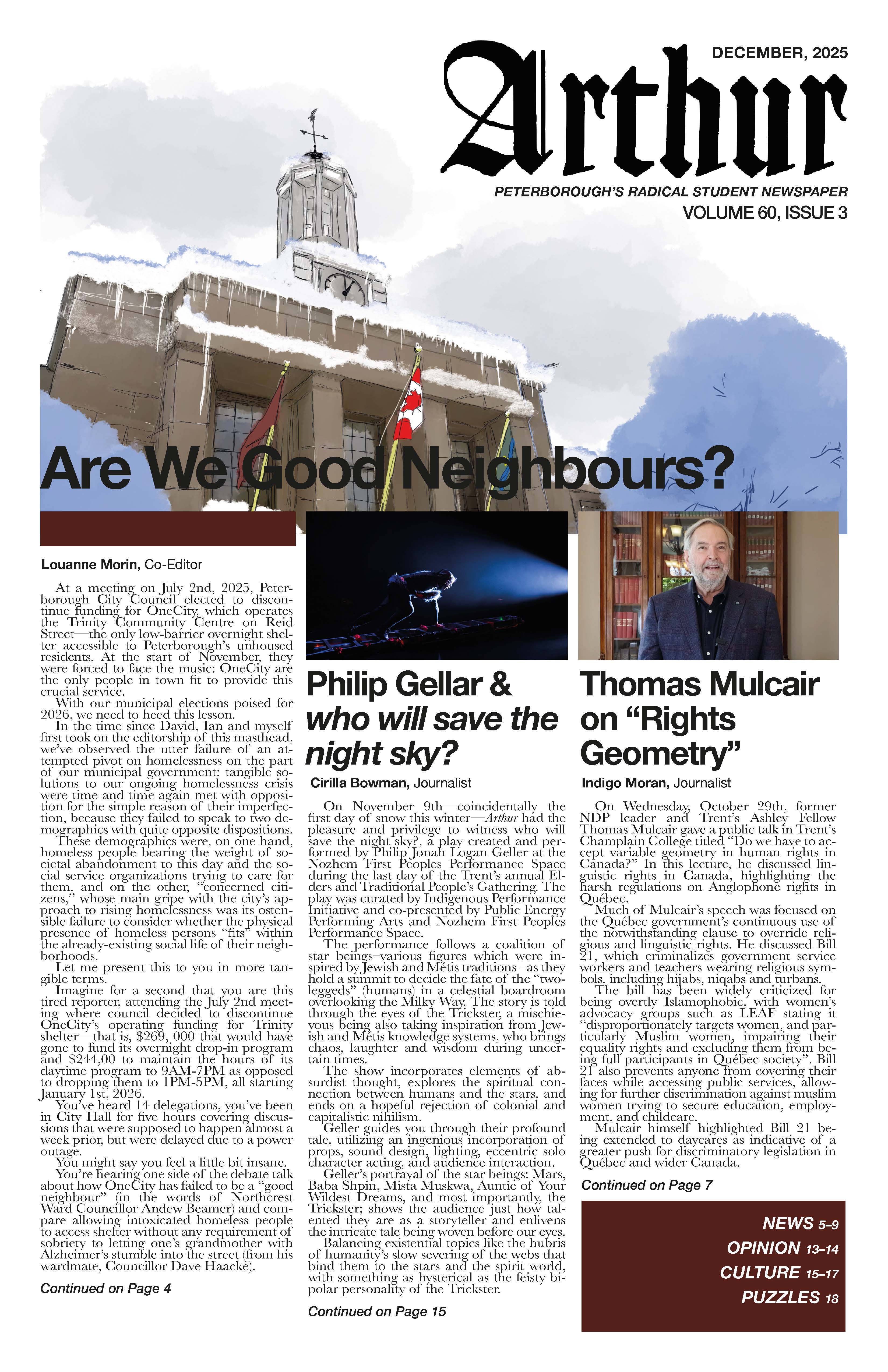I have been fortunate enough to make my grand debut at City Hall alongside Arthur’s Editor-In-Chief and City Hall regular, Sebastian-Johnston Lindsay on May 8th, where I willingly dove head first into a municipal pit of snakes to witness the unfolding of what can only be described as a middle school fight over who gets to kick the ball at recess.
The meeting in question saw the proposal of modular housing to be implemented at 210 Wolfe Street, which just recently received final council approval on May 23rd. My fortune lies in the exposure of our entrusted city councillor’s biases being on full display over such a pressing and controversial issue. There was no room for formalities—I saw up close and personal just how divided the council is when it comes to basic human decency.
My previous duties as Arthur’s copy editor in Volume 57 involved editing Sebastian’s weekly reports on City Hall, which, having now joined him, I can say with absolute certainty he does not embellish the mind-boggling behaviour present at the horseshoe table.
Take this first impression of Council as a running reminder that just because someone should, doesn’t mean they will.
First off, I need to acknowledge that City Hall employs the friendliest security guards I have met thus far.
Moving on.
Speaking solely on the meetings I have personally attended, to which the events on the table were much more pressing than usual, you will find an audience full of disappointed, frustrated, and understandably pissed-off citizens waiting to witness whether or not their concerns will be taken seriously by their government officials—many of whom appear to prefer hearing themselves talk more than doing their job.
You will also find audible gasps, shaking of heads, and justified annoyance from the general public in attendance whenever a councillor inevitably makes a comment that immediately undermines the entirety of the cause for concern in the first place. Such as Councillor Kevin Duguay questioning his responsibility in the matter of combating chronic homelessness in Peterborough on May 8th: “Why does the city have to shoulder the entire responsibility of this problem?”
When the meeting is adjourned, you will find the public in attendance leaving angrier and more disappointed than they were beforehand, and come to understand that despite the lack of professionalism found amongst a few of the council members, there is no solution to please everyone when it comes to politics.
The delegations are where the heart and soul of the meeting really lie. Here, people get an opportunity to speak for five minutes about their concerns, support, or suggestions for the matter at hand. At the most recent council meeting on May 23rd, the delegations made it clear that the majority of the residents in and around Wolfe Street, where the current homeless encampment is set up outside what had been intended to be a temporary overflow shelter, do not support council’s planned action on homelessness as it stands. It was, however, later passed that night with no changes in regards to the location of the modular homes.
When it comes to the City Councillors themselves, there is a clear-cut divide between them. There are those who propose actual, meaningful amendments, ask questions with a clear end goal, take into consideration the voices of the people they represent, and then there are those who choose to walk the alternative path of deception and ill-faithed suggestions.
Take Councillor Dave Haacke as a shining example: he suggested forced and involuntary treatment centres for those who, in some hypothetical scenario of his own devising, refuse to accept the support services and housing soon to be available in his constant argument that any accessible support is seen as enabling addiction—because nothing says enabling addiction like voting against addiction support.
There is a strong sense that most council members do not stray from their preconceived biases and take the time to understand—much less comprehend—the proposal at hand. I have spent hours listening and reading over the back and forth between councillors and it has become clear to me that real, meaningful change is not on the horizon for our city when our council is split between those who have felt human empathy, and those who cosplay as caring public servants when their actions prove them to be anything but.
At times, sitting in the media booth and listening to actual, attainable change be thrown into absurdity by councillors who seem to have a vendetta against moving forward is incredibly discouraging. Watching full-grown adults be gentle parented on the ethics of providing life-saving aid to our most vulnerable is unsurprising, to say the least.
As someone who has grown up in Peterborough-Nogojiwanong, I’ve heard the complaints and frustrations from family and friends about the state of our little city for as long as I can remember. It’s disheartening to watch in live action the meaningless debates over a subject most councillors have no intention of supporting in the first place. Councillor Leslie Parnell, for example, puts on a theatre for her constituents in wild, disorganized, and altogether unreasonable amendments that ultimately amount to nothing and undermine the seriousness of the proposal at hand.
In the game of cat and mouse that is municipal politics, the endless cycle of disappointment is not mutually exclusive to this small city. Peterborough City Council is nothing if not one step forward and three steps back. For every proposal brought forward, there is a lengthy debate over fencing, the ethics of providing accessible aid, and whether or not the city can simply send its unhoused residents to a field or not.
It’s safe to say I wouldn’t lose any sleep at night wondering if today will be the day councillors decide to work for the city rather than against each other. Hope, however, is not lost forever. Believe it or not, there are those actively striving to bring forth progressive change and who—surprisingly—take the time to listen to the community. Councillors such as Alex Bierk, Joy Lachica, and Matt Crowley are shining examples of the bright possible future for the city of Peterborough.


.png)


.jpg)


.jpeg)



.jpg)


.jpg)

.jpg)
%20(16).png)

.jpg)
.jpg)



.png)